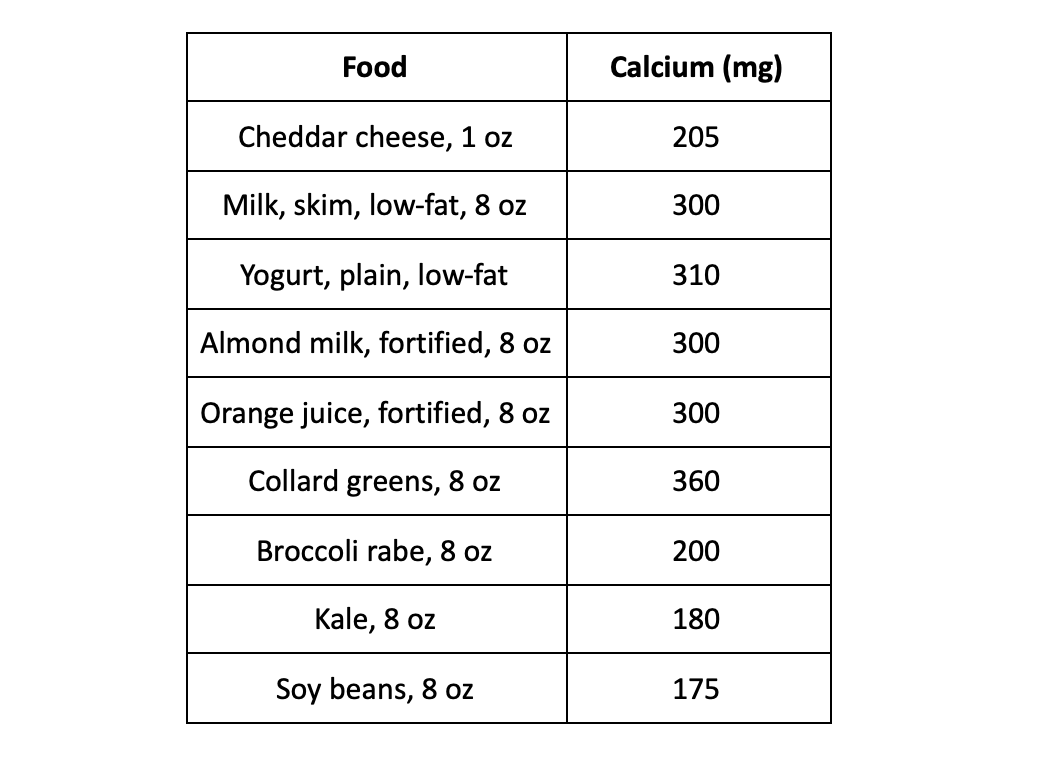Calcium is that vital mineral we need to keep our bones dense and strong. How do you get it? How much do you need? Read on to learn the basics.
Calcium is a critical mineral to building dense bones early in life and keeping them strong and healthy as you age.
Calcium also enables our muscles to contract, our blood to clot, and our heart to beat. Most of the calcium in our bodies is found in our teeth and bones.
Even though calcium is the most abundant mineral in our body, we lose it through our hair, nails, skin, sweat, and urine every day.
Because our bodies cannot create their own calcium, we must make sure to get enough from eating the right foods and taking supplements if necessary.
The role of calcium in our bones
Throughout our lives, our bones are constantly absorbing and depositing calcium, continuously remodeling themselves into new bones.
In young children and teens, the formation of bones happens to a greater degree than the amount of calcium is absorbed.
As we approach old age, this trend is reversed, and our bones tend to break down faster.
This can lead to bone loss and osteoporosis as time goes on.
How much calcium do I need?
The National Institutes of Health recommends that adult males between 19 and 70 years old get 1,000 mg of calcium per day.
Adult women 19 to 50 years old should get 1,000 mg per day, and women between 51 and 70 years old get 1,200 mg each day.

What to know about calcium supplements
We absorb only 30% of the calcium in the foods that we eat, so it is sometimes necessary to take a calcium supplement if getting enough is a concern.
When choosing a supplement, pay attention to the form of calcium that is provided. The two types of calcium found in supplements are calcium carbonate and calcium citrate.
Calcium carbonate is inexpensive and commonly available, but should be taken along with food to be absorbed most effectively.
Calcium citrate can be taken with or without food and is recommended for people with gastrointestinal and absorption conditions.
Ever spot an orange juice fortified with calcium? Calcium citrate is the type generally found.
One thing to keep in mind is that the higher the concentration of calcium in a supplement, the less absorption your body will achieve. We absorb calcium best when taken in doses equal to or less than 500mg at a time.
Vitamin D and the absorption of calcium
We need vitamin D to help us absorb calcium well, as it helps us to form a hormone called calcitriol which is needed for absorption.
We can get vitamin D by exposing our skin to sunlight, from eating certain foods, and by taking a supplement.
The general recommendation is 600 IU of vitamin D per day for people under the age of 70, but for those who are deficient in vitamin D, this amount may be higher.

Getting too little or too much calcium
Certain groups of people, like postmenaopausal women, people with milk allergy or lactose intolerance, vegetarians, and girls and women over the age of 4, as well as boys between 9 and 18 years old and older than 51 years, are particularly vulnerable to not getting enough calcium.
The body tries to keep the concentration of calcium in the blood and muscles the same regardless of what we are taking in, so when it senses it is not getting enough, it will take calcium from bone tissue to replenish.
This can lead to osteoporosis in the long run, which can cause bone fractures.
Getting too much calcium is not healthy either, and can induce constipation, kidney stones, and other kidney conditions, especially when too high an amount is taken by supplement.
How much is too much? Men and women between the ages of 19 and 50 should not be getting more than 2500mg a day, whereas people older than 50 should stick to less than 2000mg.
Surprising sources of calcium
Where can you get your calcium? Of course, cheese, milk, and yogurt are the obvious winners when it comes to providing a hefty dose of calcium.
But there are other surprising plant-based sources that supply a decent amount as well.






